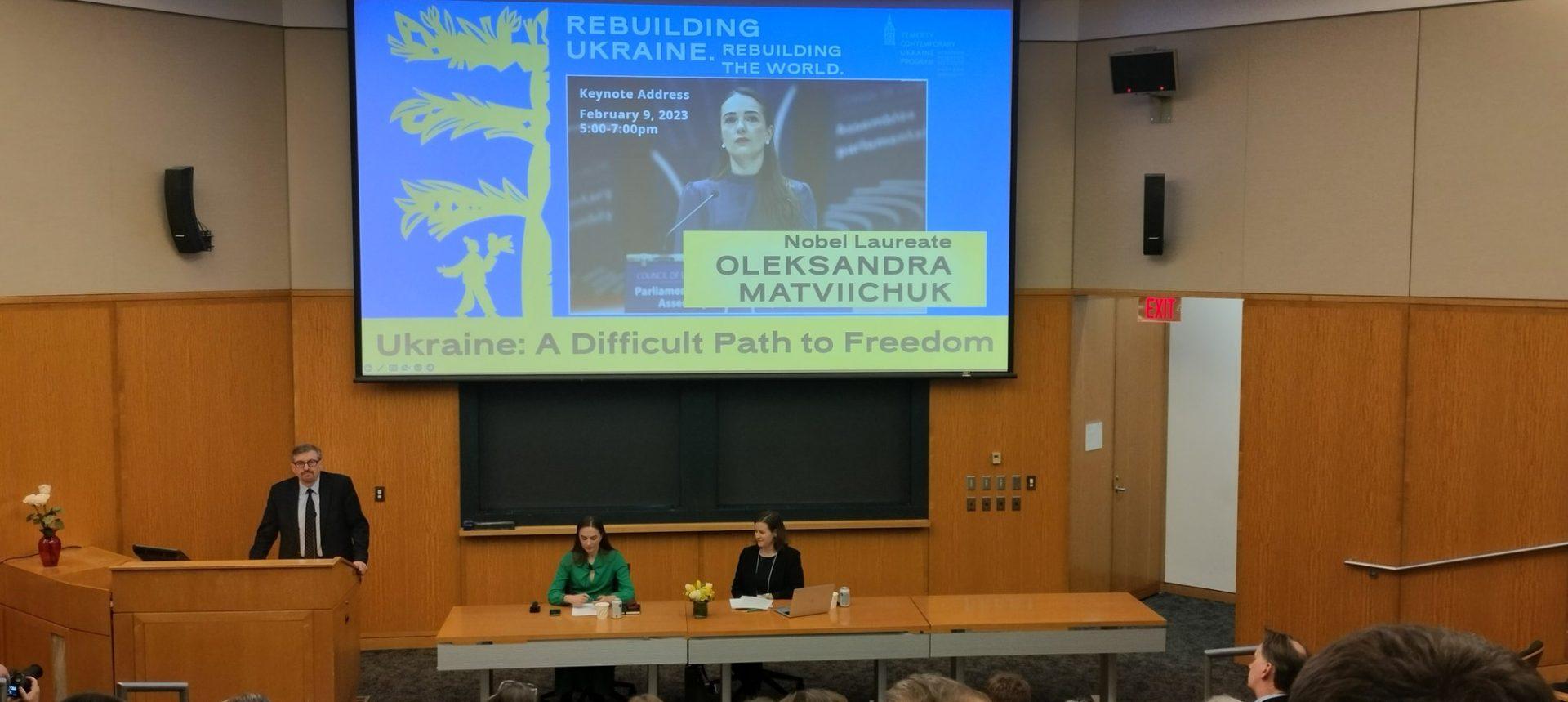Ukraine: a difficult path to freedom. Notes from Oleksandra Matviychuk’s lecture at Harvard

On Thursday, February 9, the head of the Center for Civil Liberties, Oleksandra Matviychuk, gave a lecture at Harvard entitled “Ukraine: a difficult path to freedom.” The event took place within the framework of the annual traditional conference, which is part of the J. Temertey Research Program of Modern Ukraine (TCUP). The theme of this year’s conference is “Rebuilding Ukraine. Rebuilding the world” became the future of both post-war Ukraine and the entire world, which this war has already changed and continues to change. We have collected the main theses from the lecture for you.
About peace. Ukraine desires peace more than anyone else. Yet, peace does not come when the attacked country lays down its arms and halts its defense. In that case, it is not peace but occupation. Peace is the freedom to live without fear and to have a long-term perspective. Therefore, the calls not to provide Ukraine with weapons for defense, because it allegedly contributes to the escalation of the conflict, are not just wrong. At the time of the full-scale invasion, Russia’s military potential was incommensurable to Ukraine’s, Russia had a many times larger population, and was considered the 11th largest economy in the world. If, under these conditions, you do not help Ukraine defend itself from Russia’s attack, then you assist Russia to occupy Ukraine.
About justice. Modern technologies allow us to document war crimes, what we could not even dream of 15 years ago. Ordinary people have access to various digital tools. We can recreate the picture of events and identify the war criminals without even being on the spot. Unfortunately, international criminal justice cannot boast of rapid development unlike digital technologies. The development of international law is constrained by politics and our prejudices. Justice should be independent from the strength of an authoritarian regime. A war turns people into numbers. Only justice can return people their names as well as human dignity. Sociologists asked Ukrainians what would be their greatest disappointment after the war ended. The vast majority, 65,8 percent, answered – impunity for Russian war crimes. Justice should not wait for the end of the war. It is necessary to establish a special tribunal on aggression and bring Putin, Lukashenko and other perpetrators of this crime to justice.
About the international system. Armies are talking now, and international law is not working. Nevertheless, I believe it is temporary.We are to start a fundamental reform of the peace and security system. It must protect people from wars and the arbitrariness of authoritarian regimes. Human rights must be central to this new system. For the reason that a state that kills journalists, imprisons activists or disperses peaceful demonstrations poses a threat not only to its own citizens. Such a state poses a threat to the entire region and peace worldwide as a whole. Russia is a vivid model, as it has consistently destroyed its own civil society. Meanwhile, the countries of the democratic world turned a blind eye to this for a long time.
About recovery. When people talk about recovery, first of all they imagine the restoration of destroyed buildings, roads, and infrastructure. This is important and essential, but persons affected by the war are to be one of the priority groups in the recovery process. Recovery should also refer to the reconstruction of democracy and strengthening of democratic institutions, which underwent additional human rights restrictions due to security requirements during the martial law. During war, there is a danger of becoming a mirror of the enemy side and start copying their methods. Winning the war and turning into ourselves into Russia does not make any sense. After the war ends, there is a danger of locking up in one’s trauma and starting to draw boundaries between different groups in society. On contrary, we have to rise above our own pain in order to be able to build stable democratic institutions rather than shaky structures.
About the future. Predicting the future is an ungrateful task, especially in our world, which has become very fast, hyper-complex and interconnected. Let me say this, I am optimistic about the future. Although I do not find it that easy. Ordinary people have a lot more impact than they realize. These trials force us to reveal our best features and fight for freedom, take responsibility, be brave, make the right choices, and help others.
The world needs Ukraine’s success in the struggle for freedom and democracy. Because only the spread of freedom makes our world safer.

